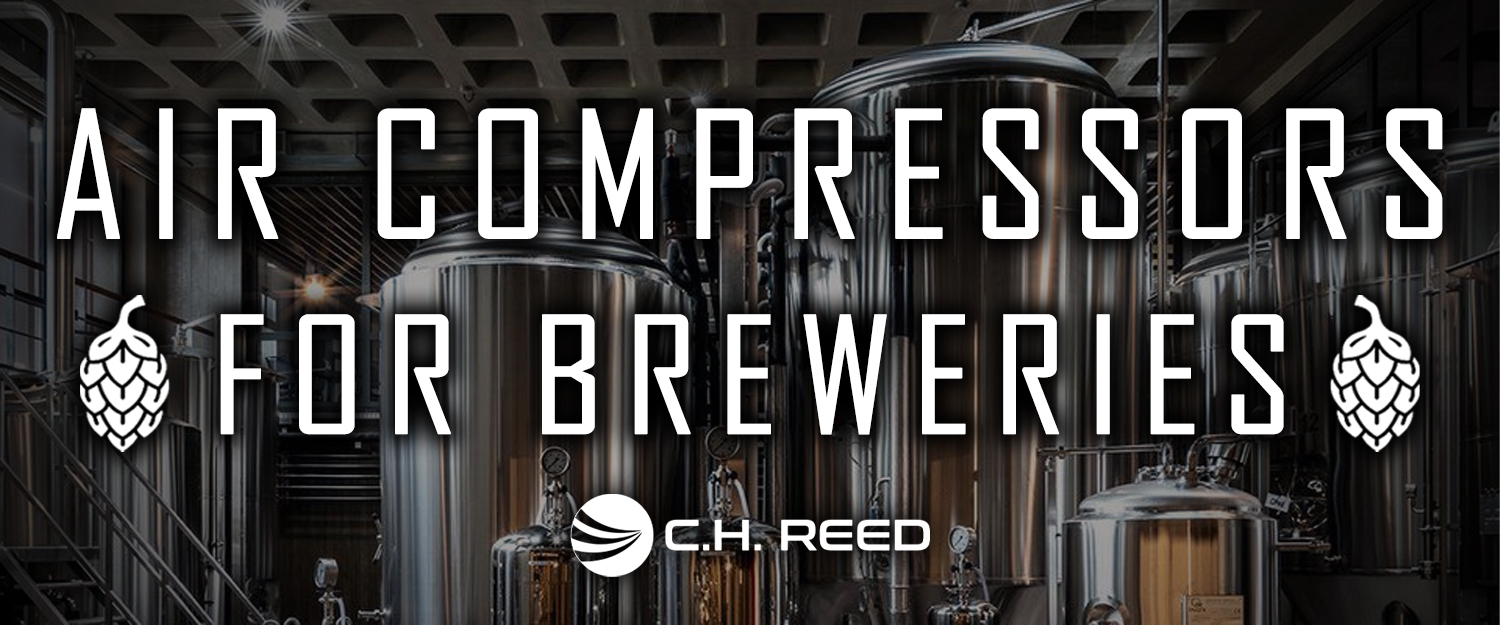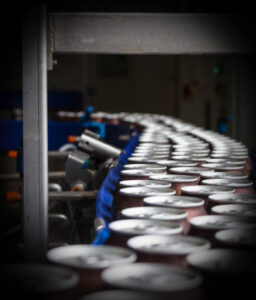July 27, 2023
Air Compressors for Breweries
SHARE THIS POST

Beer is the third most popular drink in the world, only behind water and tea. The beer market in the United States is a $115.4 billion industry. This is a combination of domestic beer production (64.5%), craft beer production (13.2%), and imported beer (22.2%). According to Grand View Research, the global beer market is expected to grow at a compound annual growth rate (CAGR) of 7.0% from 2022 to 2030.
As the beer market grows, so does the market for the equipment used in brewing operations. One piece of essential equipment, that people might not think about when they think of brewing beer, is air compressors. Compressed air plays a fundamental role in the production of beer, from smaller scale microbreweries to the large-scale domestic powerhouses. In this article, we will go over some of the basics on how air compressors for breweries are chosen, along with numerous applications.
How Breweries Use Air Compressors

Breweries use air compressors for a wide range of applications because of their resourcefulness, cleanliness, and flexibility for streamlining different processes. Some of these common applications include:
- Moving and Transferring Beer: Air compressors power the equipment and pumps used to move beer from conditioning tanks to other, various stages in the process, like bottling and canning lines. Compressors also help keep the lines clear and dry between batches.
- Aerating: Aerating is the process of introducing oxygen to the yeast cultures in the fermentation process. The yeast needs oxygen to convert sugars to alcohol. Compressed air is a very easy way to do this in a controlled, clean, and effective manner.
- Filling, Bottling, Canning, and Labeling: Bottling and canning equipment is one of the most common uses of compressed air in brewing. Pressurized air is needed to power these systems that fill bottles, cans, and kegs and to properly label the bottles and cans.
- Clarifying Beer: Clarifying is the process of removing solids from beer to eliminate the hazy look. (Unless you’re brewing a hazy IPA of course.) Clarifying gives the beer a cleaner look and crisper taste. Some breweries have air compressors to power centrifuges that clarify the beer and create quality results.
- Cleaning Equipment: Clean equipment, clean lines, and clean everything is of utmost importance when it comes to brewing quality beer. Even the slightest of impurities can alter the taste of beer and contaminate entire batches, meaning wasted product ($$$) down the drain. Brewers use air compressors to clean all kinds of equipment, including tanks, kegs, bottles, transfer lines, and other integral system components.
Common Types of Air Compressors in Brewing Operations
Identifying and purchasing the right air compressor for your specific brewing operation is crucial to production, overall product quality, and the specific needs that your brewery has. The most common air compressors that brewers rely on are oil-free rotary screw compressors, oil-flooded rotary screw compressors, and reciprocating (pistons) compressors.
- Oil-Free Rotary Screw Compressors: It is recommended that breweries use an oil-free rotary screw air compressor for applications where the air stream comes in contact with the actual beer during the brewing process. The most common examples include moving and transferring beer from tanks and the aeration process. With an oil-free rotary screw compressor, you greatly reduce the risk of contamination, saving you wasted product and rework. It is integral that you use the right combination of air treatment equipment and aftermarket accessories to produce the most contaminant-free air possible, even with an oil-free unit.
- Oil- Flooded Rotary Screw Compressors: Rotary screw style compressors are usually the preferred choice in the brewing world because they are reliable, energy efficient, offer continuous and consistent air flow, and are generally more quiet than reciprocating compressors. Rotary screw compressors are suitable for long-term applications that require continuous air all day. However, oil-flooded units should generally be avoided in aeration processes or cleaning certain pieces of equipment that directly touches the product. Oil-flooded units should be used with refrigerated air dryers, in-line air filters (to remove moisture, oil, and other airborne contaminants), and food-grade oil.
- Reciprocating (Piston) Compressors: Smaller breweries tend to use reciprocating air compressors to help power different types of pneumatic equipment in their facility because of their affordable up-front costs. They use them to help wash parts and equipment and other low-pressure tasks. Similarly to oil-flooded rotary screw units, you should only use piston compressors for powering equipment and for tasks that do not come in contact with your beer lines because they use oil to operate, which can leak into your lines and contaminate the beer.
How to Choose the Right Air Compressor for Your Brewing Operation
Every brewery is different, so their compressed air equipment needs will be different. Air compressors come in various types (As listed above), sizes, and powers. Ultimately, the compressor(s) you select will depend on your exact needs. Things to consider include:
- Budget: Be sure to factor in the up-front costs of the compressed air equipment as well as the total cost of ownership. Keep in mind that air compressors run off electricity. Calculate what your air requirements will be and how much you’ll be running the compressor. A general rule of thumb in finding the “total lifecycle cost” of an air compressor is the upfront purchase price will be 12%, maintenance will be 12%, and the electricity it takes to operate will be 76%.Rotary screw units are much more energy efficient compared to reciprocating compressors and could cost you less in the long run. But it all depends on your production needs. Further, a used air compressor will be less expensive than a new compressor but could result in higher costs due to energy consumption and repairs over time.Lastly, keep in mind the importance of a properly serviced and maintained compressor to keep your facility up and running.
- Your Production Needs: The size of your operation and what your future plans are will be variables in purchasing your compressed air system. If you’re a larger brewery, you need a compressed air system that can handle a lot of demand and continuous use. For smaller breweries starting out, you can select a smaller unit to save upfront costs, but need to make sure you have room to scale, if you plan to do so. If your unit is improperly sized (too big or too small) you could be spending unnecessary money on maintenance and repair from running too much, or increased energy costs.
- Real Estate in your Facility: Equipment like compressed air systems can take up a good amount of space, depending on the unit. Consider the amount of space you have when buying a compressor. It’s important to locate your compressor somewhere with clean air, away from harsh environments, and easily accessible for maintenance. If your facility is low on internal real estate, C.H. Reed can help with a custom container compressed air system designed to be placed outside of your building.
- Maintenance: Routine preventative maintenance looks different for the different types of air compressors listed above. Be sure to stay on top of daily, weekly, monthly, quarterly, and biannually maintenance checks for optimal compressor performance. It is highly advisable to partner up with a knowledgeable compressor expert, like C.H. Reed, to take care of your equipment for you and ensure your investment is being properly taken care of.
- Warranties: Newly purchased air compressors will come with a manufacturer’s warranty. Different brands have different warranty terms and requirements. If you do not maintain the equipment to the manufacturer’s specified terms, it could void the warranty. This is another reason to take advantage of C.H. Reed’s preventative maintenance programs as we will follow the manufacturer’s specifications to meet warranty requirements.
Contact C.H. Reed for More Information About Air Compressor Solutions for Breweries
Every brewing operation is different. With these variables, comes different equipment needs. C.H. Reed can help you properly size and identify a high-quality compressed air solution specific to your brewery’s requirements. We can also provide the service, repair, and preventative maintenance on your equipment to keep you up and brewing. Contact us today to learn more about our value-added compressed air solutions.
Search
Categories
Get a consultation
Related Posts
The 3 Distinct Advantages of Hydraulic Powered Pumps
Recently, C. H. Reed helped a major printing operation install a new ink pumping system. The new system needed to transfer four colors of high viscosity, heat-set ink to their three presses, drawing the ink from multiple 5,000…
Simple Ways to Reduce Waste in Your Spray Finishing System
In today’s demanding manufacturing landscape, it can be convenient to adopt a “cut-costs-at-all-costs” mentality, justifying questionable means for the sake of leaner production, a lower bottom line and increased profitability. Regrettably, those efforts can interfere…
What You Need to Know About Air-Powered Pressure Washers
Pressure washers are great solutions for your average cleaning applications, but what tool do you turn to for your more challenging applications? There are many instances where it is simply impossible to use a traditional…
